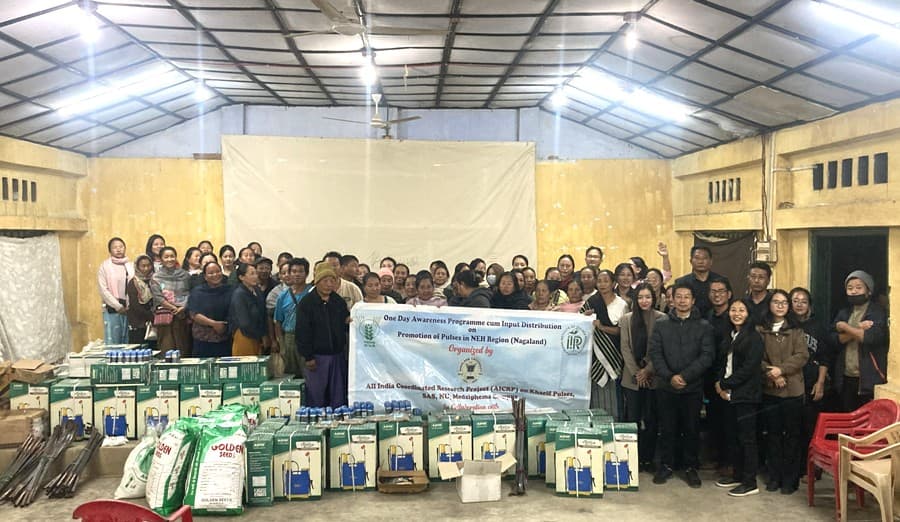A one-day pulses promotion programme was held at Peducha village, engaging farmers and institutions to boost pulse cultivation in Nagaland.
Share

DIMAPUR — A one-day awareness programme-cum-input distribution on the Promotion of Pulses in the North Eastern Hill (NEH) Region (Nagaland Centre) was held at Peducha village on November 17.
The programme was organised by the Indian Council of Agricultural Research-All India Coordinated Research Project (ICAR-AICRP) on Kharif Pulses, School of Agricultural Sciences (SAS), Nagaland University, in collaboration with Indian Institute of Pulses Research (IIPR), Kanpur; the State Agricultural Management and Extension Training Institute (SAMETI), Medziphema; Department of Botany, Kohima Science College; Department of Agriculture, Government of Nagaland; and Department of Soil and Water Conservation, Research and Training Centre Sechu, Zubza, Govt. of Nagaland.
According to an update, Dr. Aditya Pratap, PC, AICRP on Kharif pulses, was the special guest, while Dipak Sinha, PVC, Medziphema Campus, Nagaland University, was the guest of honour, and Dr. Hironya Kumar Borah, chief scientist, RARS, Shillongani, was the special invitee.
The farmers were also addressed by the different collaborators, namely, Bodevi Shyuya, director of SAMETI and principal of the Institute of Extension Training Centre (IETC), Govt. of Nagaland; Dr. Samadangla Ao, associate professor, Department of Botany, KSC; Kekhrieletuo Yhome, district agriculture officer, Dept. of Agriculture, Govt of Nagaland; and Zuchumi Ovung, junior soil conservation officer, Department of Soil and Water Conservation.
Also read: SBI’s CSR boosts healthcare and education in Nagaland
Term of Fourth Nagaland State Finance Commission extended
A brief presentation on the Kharif Pulses Programme was made by Dr. Lawrence Kithan, scientist, AICRP on Kharif Pulses, SAS, Nagaland University. Dr. Hironya Kumar Borah shared about the importance of pulses and the contribution of the farmers in this regard.
Dr. Aditya Pratap dwelt on the different aspects of pulses in terms of being the main protein source in diet, the different government policies, particularly the National Pulses Programme focused on the NEH region, and the potential of pulses in the state of Nagaland. He also applauded the performance of AICRP on Kharif Pulses at SAS, Nagaland University, in reaching the farmers at the grassroot level.
Dipak Sinha praised the efficiency leading to the success of the programme and also the collaborative effort of the Ministry of Agriculture and ICAR with Nagaland University and different state departments to cater to the farmers as the end beneficiaries.
A total of 62 farmers who attended the programme received inputs such as knapsack sprayers, seeds (chickpea and pea), milled arhar (dal) minchu, pseudomonas sp. scrapper and sickle.